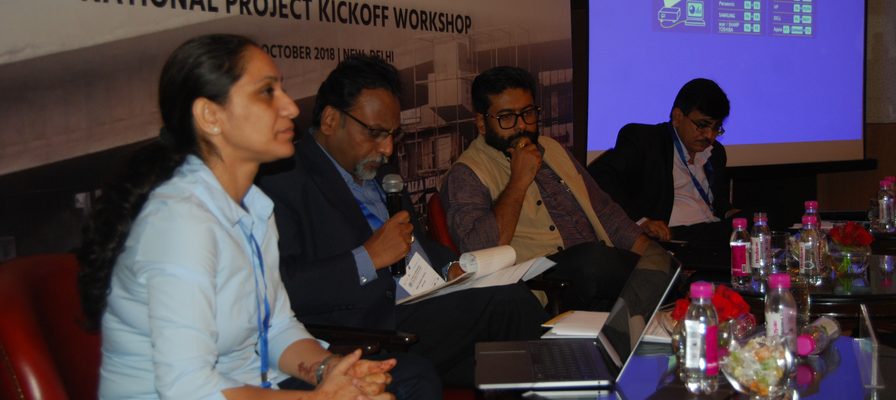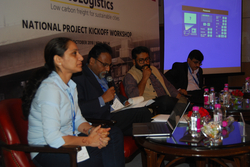The EcoLogistics – Low Caron Freight for Sustainable cities kicks off in India

The national kick-off workshop for the project “EcoLogistics – Low Caron Freight for Sustainable cities” was organised on the 31st of October in New Delhi.
The project aims to prioritise strategies that will focus on promoting the transportation of goods with minimised impacts on air quality, noise, health, fatalities & injuries, traffic congestion and reduced GHG emissions. A first of its kind and a global initiative, the project will assist cities to develop Low Carbon Action Plan for Urban Freight, support implementation of demonstration projects in cities, and highlight national policy recommendations for urban freight sector. The project is supported by the German Federal Ministry for the Environment, Nature Conservation, Building and Nuclear Safety (BMU) through its International Climate Initiative (IKI) program. In India, the project is being implemented in cities of Kochi, Shimla and Panaji.
Mr. Aman Sharma, Director, Logistics Division, Department of Commerce, Ministry of Commerce and Industries welcomed the Ecologistics project calling it a timely initiative and stated that the learning from the project should be relevant to the entire freight and logistics sector in India. He encouraged the project team to share the findings and outcomes of the project activities as well as any policy recommendations with Logistics Division at the earliest as the project gets implemented."
Mr. Sharma also requested the project team to share the findings of EcoLogistics project as it could be helpful to initiate discussion on National Urban EcoLogistics Policy.
Mr. Anand Iyer, Chief of Program, National Institute of Urban Affairs shared his experiences and suggested decision makers, consider the longer-term goals instead of shorter-term goals.
He further said that the existing 20-year master plan which regulates urban land-use needs to cope up with rapid development witnessed by Indian cities. Mr. Iyer suggested the project team to investigate the e-commerce sector, which is increasing at a rapid pace.
Dr. J R Bhatt, Advisor, Ministry of Environment, Forest and Climate Change, in his keynote speech, suggested the project team to focus on the need for consideration of the environment in the process of planning for the future.
He said that India has the target of reducing the emissions intensity of GDP by 33% to 35% by 2030 below 2005 levels. India mentioned freight in NDCs as a means of mitigating climate change, creating opportunities for cities to implement its national climate targets. Thus, decarbonising urban freight is a great opportunity for cities to help national governments to achieve their targets.
While introducing the project details, Mr. Himanshu Raj, ICLEI stated that the project will create baselines of GHG emissions generated by the freight sector. These assessments will be the basis to develop their respective Low Carbon Action Plans for Urban Freight (LCAP-UF). The LCAP-UF will define the GHG emissions reduction targets and corresponding actions, so as include a list of proposed demonstration projects. To showcase the potential of low carbon urban freight strategies identified in the LCAP-UF, a set of demonstration projects will be implemented. Based on the outcome, national policy recommendations will be suggested to strengthen appropriate framework conditions for local actions to improve urban freight.
The project introduction was followed by a presentation from project cities on issues and challenges related to urban freight. The city representatives present were Mr. Vijay Kumar, Councillor, Kochi Municipal Corporation; Mr. Sachin Ambe, Municipal Engineer, Panaji Municipal Corporation; Mr. Dewa Sain Negi, Regional Manager, City Transport Shimla.
The project launch was followed by a panel discussion on “Bringing Focus on Sustainable Management of Freight in Indian Cities”. The talk was moderated by Prof. Sanjay Gupta, and the panelists were Mr. Samir Sharma, Vice President, DIMTS Ltd.; Mr. Partha Bosu, Advisor, Environment Defence Fund and Ms. Akshima Ghate, Principal, Rocky Mountain Institute.
